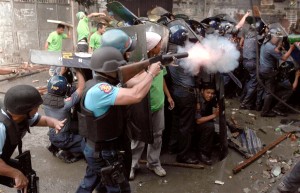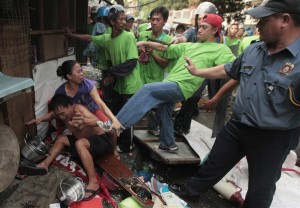Every nation has its own language. Culture, tradition, and social norms make up that dialect. Even countries that share the same spoken language have their own vernacular. But there’s something remarkably universal to the sound of the Egyptian people; a sound that resonates across the globe. Among the Egyptians, they demand of Mubarak,” La Vache Qui Rit” or STEP DOWN NOW. Their body language, however, speaks even louder to the global community, “We have had enough.”
While our president Barack Obama calls for non-violence and the US media pegs this “protest” turned “revolution” turned “revolt” turned “raging violence” turned “crisis,” (See how easy it is to change the tone of international news?) one can only wonder what you would do if you had the opportunity to voice your dissent after a lifetime of abject poverty, injustice, and human rights violations. At times, reports from Egypt are conflicting and confusing and it’s unclear as to who is doing what and who is ordering what to happen. News reports come in with varying tones and broad predictions about the future, but what strikes me is that the origin of this revolution took shape from Egyptians simply wanting their freedom and these demonstrations signify decades of pent up fury at failing legislation and corrupt social policies.
There’s something intangibly human about thousands of people walking the streets in defiance. I may not understand much more than that, but this much I know is true: the cry of the oppressed often reflects the size of the boot which rested on their throats before they could breathe.
Are the events in Cairo, though, all that different than what is happening in other parts of the world?

Take a look at San Juan City in the Philippines. In the wake of demolition teams and law enforcement using tear gas and snipers to vacate and destroy Corazon de Jesus village, where over a thousand people would be displaced in the name of building a new city hall, a conflict between residents and the demolition team and law enforcement turned violent.
To bring this violence to the public, the residents of Corazon de Jesus held a rally, they voiced their dissent by coming together to demand an investigation in to why they were attacked, why tear gas and guns were used against them when they have been the homeless and thousands have built their homes on this land because there was no where else to go. The government and media will report they were “illegal residents living on government property.” (See how trendy it is to use the word “illegal” to describe unwanted people?) Never mind that there are millions of Filipinos living in abject poverty with no place to go. Never mind that they are routinely pushed out and beaten out of their own land and called “illegal.” Never mind that there were children present in this “conflict turned violent.” All the media will say is that it turned violent and the people were illegal. That’s all you need to know.
But the pictures tell a different story, don’t they?

Systematic injustice and poverty is not exclusive to the Egyptian people, nor is dictatorship that governs to protect the privileged. Throwing stones, bottles, and rallying, therefore, is not exclusive to the Egyptian revolution either. It is the language of the poor whose freedoms and livelihoods have been stolen and have no other alternatives. It’s easy to get caught up in the labels and terms the media uses in their categorization of other nations. It’s easy to call on the poor to exercise calm and restraint against the military or government when they show signs of unrest because most of us blogging in the United States about other nations’ uprising have never lived in such abject poverty, been harassed and patrolled, or organized for our very survival.
It’s easy to wish for peace, it’s another thing to fight for it.